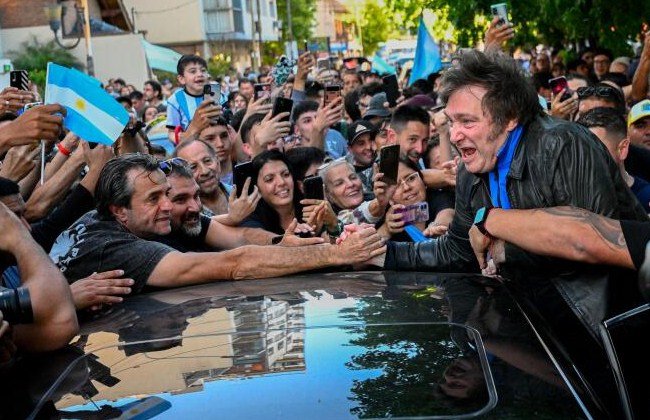Milei wins first round of presidential election
Javier Milei, the ultra-right libertarian and self-proclaimed anarcho-capitalist, has won the first round of Argentina’s presidential election on Sunday, with 29.9% of the votes. He will face Sergio Massa, the centrist finance minister and candidate of the ruling Peronist coalition, who came second with 36.6% of the votes, in a runoff on November 19. Milei’s victory has surprised many observers, who expected Massa to win comfortably, as most polls had predicted. Milei has capitalized on the anger and frustration of many Argentines, who are fed up with the country’s economic crisis, high inflation, poverty and corruption.
Milei’s radical economic proposals
Milei, a 52-year-old economist and TV personality, has proposed a radical economic agenda that includes abolishing the central bank, the income tax, the minimum wage, the public pension system and most public services. He also wants to legalize the sale of bodily organs, relax gun laws, ban abortions and withdraw from international organizations such as the United Nations and the International Monetary Fund. He claims that his policies would turn Argentina into a prosperous and free country, similar to the United States or Italy. He has also expressed his admiration for former US president Donald Trump and Brazilian president Jair Bolsonaro, and his disdain for Pope Francis and climate change activists, whom he has insulted with vulgar language.
Business community skeptical of Milei’s plans
However, Milei’s ultraliberal agenda has left the business community skeptical and worried about the potential consequences for the country’s economy and stability. Many business leaders fear that Milei’s plans would lead to more social unrest, violence, isolation and uncertainty, and that they would undermine the efforts to renegotiate the country’s massive debt with foreign creditors. They also doubt that Milei would be able to implement his reforms, given the opposition from the Congress, the judiciary, the trade unions, the media and the civil society. Some analysts have warned that a better-than-expected showing for Milei would likely upset the financial markets and lead to a sharp plunge in the value of the Argentine peso.
Massa appeals for unity and moderation
Massa, on the other hand, has appealed for unity and moderation, and has presented himself as the best option to lead the country out of the crisis. He has promised to continue the policies of the Peronist government, which include increasing social spending, boosting domestic production, strengthening the public health system and seeking a sustainable agreement with the IMF. He has also received the support of several Latin American leftist leaders, such as Brazil’s Luiz Inácio Lula da Silva and Colombia’s Gustavo Petro, who have congratulated him for his first-place finish and have expressed their hope for a progressive victory in the runoff.
Runoff expected to be tight and polarized
The runoff between Milei and Massa is expected to be tight and polarized, as both candidates will try to attract the voters who supported other options in the first round. The third-placed candidate, the conservative former security minister Patricia Bullrich, who received 13.4% of the votes, has already announced that she will endorse Milei, as well as most of the right-wing parties and media outlets. However, some moderate and centrist voters may prefer Massa over Milei, as they may see him as a more reasonable and pragmatic alternative. The final outcome of the election will depend on the turnout, the campaign strategies, the economic situation and the public opinion polls, which have proven to be unreliable in the past.

